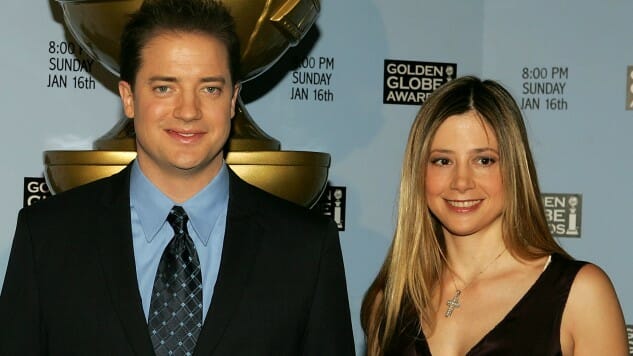HFPA Responds to Brendan Fraser’s Sexual Assault Accusations Against Former President
Photos by Alberto E. Rodriguez/Getty Movies News Brendan Fraser
In December of 2004, Brendan Fraser announced the nominations for the 62nd Annual Golden Globe Awards alongside previous Globe and Oscar winner Mira Sorvino, who recently accused Harvey Weinstein of sexual assault. Just a year earlier, Fraser was at a luncheon held by the Hollywood Foreign Press Association (HFPA), the organization that hosts the Golden Globes. Upon his departure from the event, former HFPA president Philip Berk followed Fraser into a crowded room to shake his hand.The former HFPA president instead did something different, according to Fraser in an exclusive interview that’s been spreading across the web like wildfire over the past 24 hours: “His left hand reaches around, grabs my ass cheek, and one of his fingers touches me in the taint. And he starts moving it around,” Fraser told GQ.
The Hollywood Foreign Press previously mentioned it had no idea about this groping, even though Berk addressed it in his memoir, With Signs and Wonders, stating he playfully “pinched Fraser’s behind as a joke.” This obviously was no joke to Fraser, who characterized it as much worse than a “pinch.” Berk took a leave of absence from the HFPA in 2014 after his memoir faced backlash but remained a member, and soon everyone forgot about his friendly pinch. The HFPA issued a statement on Friday morning responding to Fraser’s accusation in the GQ article, saying:
The HFPA stands firmly against sexual harassment and the type of behavior described in this article. Over the years we’ve continued a positive working relationship with Brendan, which includes announcing Golden Globe nominees, attending the ceremony and participating in press conferences. This report includes alleged information that the HFPA was previously unaware of and at this time we are investigating further details surrounding the incident.
Berk also responded to the allegations in an email to GQ, saying, “Mr. Fraser’s story is a total fabrication.”
After the sexual assault in 2003, Fraser said he felt ashamed, becoming more reclusive as the incident caused him to want to retreat from public life. He said in the interview, “Am I still frightened? Absolutely. Do I feel like I need to say something? Absolutely. Have I wanted to many, many times? Absolutely. Have I stopped myself? Absolutely.” Fraser wanted to go public with the assault after it happened, but ultimately, “I didn’t want to contend with how that made me feel, or it becoming part of my narrative,” he decided.
On recalling the incident, Fraser says, “I felt ill. I felt like a little kid. I felt like there was a ball in my throat. I thought I was going to cry.” After the incident occurred, when Fraser forcefully removed Berk’s hand, he rushed out of the building, past a police officer he couldn’t quite bring himself to confess to, and then upon arriving home, told his then-wife, Afton, what had happened. “I felt like someone had thrown invisible paint on me,” he told GQ. The memory has haunted him for quite some time. Finally, with the #MeToo movement rising, he felt compelled to come forward, saying, “I know Rose [McGowan], I know Ashley [Judd], I know Mira [Sorvino]—I’ve worked with them. I call them friends in my mind. I haven’t spoken to them in years, but they’re my friends. I watched this wonderful movement, these people with the courage to say what I didn’t have the courage to say,” he said, according to Variety.
After the incident, Fraser avoided Berk and never wanted to be in the same room as him. He believes the incident also lead to downfall of his career. “The phone does stop ringing in your career, and you start asking yourself why. There’s many reasons, but was this one of them? I think it was,” Fraser says.
It wasn’t until several meetings with GQ that Fraser finally revealed this story. He called the writer, saying that “he couldn’t quite bring himself to relate [the incident] in London or New York.” He apologizes for not having “the courage to speak up for risk of humiliation, or damage to my career,” before going on to reveal the truth about the 2003 incident. Like many victims of sexual assault, he started to believe he deserved what happened, saying, “I was blaming myself and I was miserable—because I was saying, ‘This is nothing; this guy reached around and he copped a feel.’” He finished the story by saying, “Maybe I am over-reacting in terms of what the instance was. I just know what my truth is.” He was overcome with panic and fear. His truth, along with those of all the other victims of sexual assault, is the most important thing.
You can read the entire GQ profile of Fraser here.